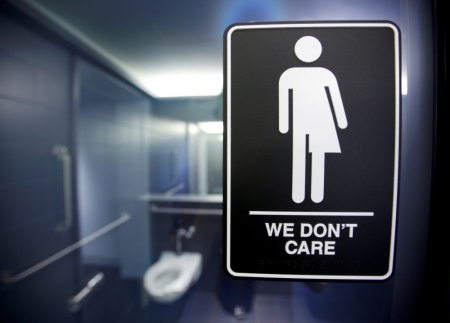Federal court approves 'compromise' to North Carolina transgender bathroom law

A federal court has approved a settlement to North Carolina’s transgender bathroom law that allows transgender individuals to use public restrooms in accordance with the gender they identify with.
After three years of legal and legislative battles, the Tarheel state reached a settlement with the American Civil Liberties Union, Lamda Legal, and six LGBT plaintiffs. On Tuesday, U.S. Judge Thomas Schroeder signed a consent decree between Democrat Gov. Roy Cooper and the plaintiffs.
While praised by LGBT advocates, the settlement has drawn the ire of social conservatives and the Republican-controlled state legislature.
The social conservative North Carolina Values Coalition slammed the settlement, calling it a “fake compromise.” The lobbying organization blasted Democrat Governor Roy Cooper and accused him of working behind the scenes to surrender privacy rights to pro-LGBT advocacy groups such as the Human Rights Campaign and Equality NC.
“Governor Cooper’s fake settlement is actually like the fox watching the hen house,” a statement from the coalition, led by longtime activist Tami Fitzgerald, reads. “He and Attorney General [John] Stein have never stood in defense of our privacy and protection when it comes to keeping men out of women’s bathrooms, locker rooms, and showers, and now they are forcing women and girls to lose their right to privacy and safety in public facilities they control.”
The coalition argues that women and children “have an equal right to safely access public restrooms, showers and changing facilities without risking their safety or seeing men’s genitals on full display.”
In 2016, the passage of H.B. 2 effectively voided an ordinance passed by the Charlotte City Council requiring businesses to allow bathroom access on the basis of gender identity and also barred people from using bathrooms, locker rooms and changing areas consistent with their gender identity in state-owned buildings.
The bill, signed by then-Gov. Pat McCrory, led to a lawsuit from the Obama administration and uproar from the political left as music performers canceled concerts, companies canceled plans they had in the state, and the NBA even felt the need to move its 2016 All-Star Game out of Charlotte.
The bill was repealed and replaced by H.B. 142 — which forbids local entities from passing ordinances that allow transgender persons to use their preferred restrooms or locker rooms — in 2017 but the ACLU and Lambda Legal were still not satisfied.
Although the new bill gave the state legislature the power to define bathroom access, the legislature has not done so.
Tuesday’s settlement states that the executive branch cannot use the state law to "bar, prohibit, block, deter, or impede any transgender individuals from using public facilities under any Executive Branch Defendant’s control or supervision, in accordance with the transgender individual’s gender identity."
The settlement leaves intact a measure preventing municipalities and city governments from passing laws that require places of public accommodation to allow bathroom use on the basis of gender identity until December 2020.
“The approved consent decree resolves the portion of the case challenging the 2017 law that replaced H.B. 2,” a statement from the ACLU reads. “It does not resolve the portion of the case challenging the lawfulness of H.B. 2 for the period when it was in effect, which has been stayed pending the Supreme Court’s resolution of several employment discrimination cases involving LGBT employees.”
Joaquin Carcano, the lead plaintiff in the case, indicated mixed feelings about the compromise.
The Republican-controlled North Carolina state legislature has filed court papers opposing the settlement, according to Reuters.
Follow Samuel Smith on Twitter: @IamSamSmith
or Facebook: SamuelSmithCP





















